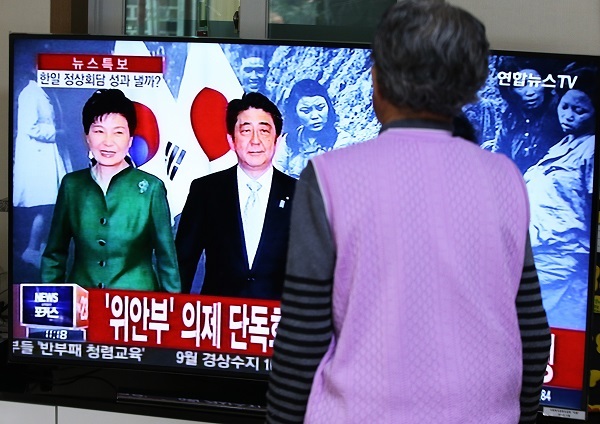Officials of Seoul and Tokyo will resume their negotiations over Japan’s colonial-era sexual enslavement of Korean women on Wednesday, the first to be held after their leaders agreed to speed up the talks during a summit last week.
Observers say that this round of talks led by directors general of each side would be a touchstone for the neighbors’ will to settle the long-festering issue within this year. They have held talks since April 2014, but no significant progress has been made.
 |
| Park Ok-seon who was forced into forced sexual slavery by Japan`s Imperial Army during World War II watches news on the summit between South Korean President Park Geun-hye and Japanese Prime Minister Shinzo Abe on Nov. 2, at a home in Gwangju, Gyeonggi Province. (Yonhap) |
Seoul’s Foreign Ministry said that Lee Sang-deok, director general of Northeast Asian affairs at the ministry, will hold talks with Kimihiro Ishikane, director general of the Japanese Foreign Ministry’s Asian and Oceanian Affairs Bureau, who recently succeeded his predecessor Junichi Ihara.
Since the first round of the talks, Japan has maintained the issue was already settled under a 1965 treaty normalizing bilateral ties. Seoul claims the “humanitarian” issue should be separate from the treaty, and the issue was not on the agenda for the negotiations over the treaty at the time.
The leaders of the two neighbors have presented their desire for an early resolution of the issue involving the sex slaves euphemistically called comfort women. There are 47 known surviving Korean victims, who are an average of 89.2 years old.
Reiterating that Tokyo’s position over the issue remains unchanged, Abe told a parliamentary budget session that his government would exert efforts to settle the issue.
“There is no change in our stance that (the issue of the comfort women) has legally been settled through the (1965) treaty,” he said.
“During the summit (with Park), the two sides shared the understanding that (the comfort women issue) should not be a hurdle to bilateral efforts to forge a future-oriented relationship. (We also) shared the need to accelerate the negotiations aiming for an early resolution.”
During a Cabinet meeting, Park renewed her calls for an early settlement of the issue.
“During the bilateral summit, the two countries agreed to speed up negotiations over the Korean victims. (I) hope (the two sides) will strive to settle this issue at the earliest possible date,” she said.
The major bone of contention is Tokyo’s refusal to take legal responsibility for the wartime atrocity.
Tokyo has previously taken steps to take “moral responsibility” such as establishing the civilian Asia Women’s Fund, which Korean victims dismissed as insincere. But it has refused to offer legal reparations and apologies.
The two sides have been struggling to gain more concessions from each other based on the three-point “Sasae proposal,” which was made by then Japanese Vice Foreign Minister Kenichiro Sasae in 2012.
The three points were a direct apology by the Japanese prime minister, the Japanese ambassador’s delivery of a letter of apology to the victims and a compensation fund from the Tokyo government.
By Song Sang-ho(sshluck@heraldcorp.com)

